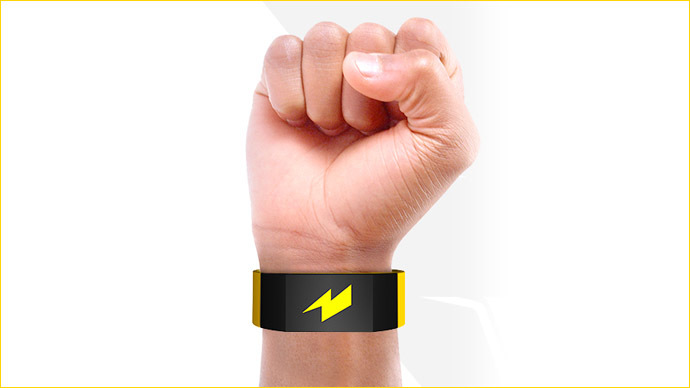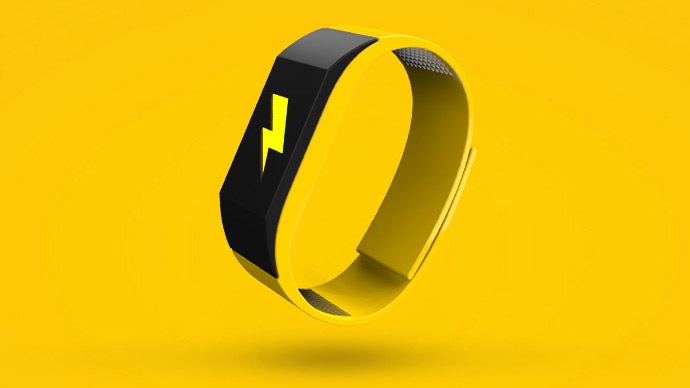Zap out of it! Wristband gives shocks to break bad habits

A startup called Pavlok has launched a crowdfunding campaign for a wristband that electroshocks its owner to encourage him or her to exercise, eat healthily, wake up on time and stop procrastinating.
The campaign was launched on Wednesday, and has already gathered over 125 percent of funds required for the project to go forward, with the initial sum indicated as $50,000.
Pavlok can help with setting goals like going to the gym regularly or giving up social networks, with the wristband electrically shocking the owner, should he/she fail to stick to the task.
"We really believe that this product will help people break their bad habits that are hurting their lives, things like biting their nails, or smoking - really negative habits. And you'll also have an interface with positive and negative reinforcements to help form good habits - such as going to the gym, or vibrating to help remind you to meditate," Maneesh Sethi, co-founder and CEO of Pavlok, told RT.
Another option Pavlok has is to make the owner pay a stranger if the goal is not achieved.
The intensity of shock wave can be modified: from 17 to 340 volts. The startup’s head of marketing told Tech Crunch some people can’t even feel it. However, for others “it may be painful. It’s not enjoyable. It’s unpleasant. But it’s not, like, severe pain.”
Pavlok can shock the person via small metal terminals, and the wave might jolt, but supposedly isn’t hazardous.
Amid the most notable Pavlok’s functions, is the alarm which goes off gently with noises and vibrations, waking the owner up, but if he or she continues to sleep, a shock wave will be sent.
A special Google Chrome plug-in also helps indicate websites the owner wants to avoid – and choose whether punishment comes once you log on to that page, or you’ll be allowed a weekly time allotment to surf it.
Maneesh Sethi tried the plug-in on himself, getting shocked five times on the first day and a couple of times on the second day. By third day, he stopped logging on to Facebook.
"There is no virus that would take it over. As it works right now, we have as much ability to control who has the app, and we writing the software to make sure it's very secure and the people who can vibrate and beep and shock with it are only the people who you give permission to," Sethi told RT.
The ready devices are set to be shipped in March or April 2015. The first early bird offers ($99) are already out, but some for $129 remain on Indiegogo.

Sethi is the author of four books, and a productivity and travel hacker, who became well-known a few years ago when he offered to pay someone who would slap him in the face whenever he tried to use Facebook.
Sethi claimed that the act increased his productivity fourfold.
The name of the device, Pavlok, is a reference to Russian physiologist Ivan Pavlov, who developed the concept of ‘conditioned reflex’. He put tasty meat powder in the mouths of dogs, making them salivate, at the same time ringing a bell. Eventually, Pavlov figured out that he could make the dogs salivate just by ringing the bell, with their bodies learning the mechanism of reward connected with the sound.
The Pavlok team now includes 10 people, but Sethi started all alone. Following the Facebook experiment, he asked his friend and world-famous hacker Dan Kaminsky what he thought of the idea to make a dog collar “that shocked me every time I go on Facebook.” The two designed a prototype, which worked, and found a co-founder in Jim Lynch, the inventor of Lego Mindstorms and a senior engineer on the Roomba. Together, they launched the project with Boston-based Bolt hardware incubator.
“People think we’re not like animals. That we have will power,” Sethi said, instantly disagreeing.
“At our core, we are animals. More than 40 percent of our time is spent in deep, automatic mode. I want to help save lives. I want to get people to stop smoking cigarettes and fight obesity. I think this product is going to be the first step towards massive health changes,” he concluded.














